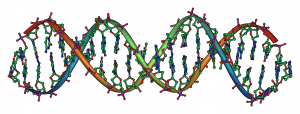
Jordan Peterson – the clinical psychologist and public speaker – is deterministic about IQ. He believes that you have a fixed IQ and that there’s nothing you can do to improve it: you need to find the right job for your IQ in the ‘hierarchy of competence’ – or you will be out of your depth and miserable. How smart you are according to Peterson is genetically hardwired and there is little you can do to change this.

Some people are naturally smart: they learn quickly, grasp complex matters, problem solve effectively and make good decisions. Others struggle. Some people are gifted – the cognitive elites with IQs of 130 plus (Mensa standard). They are destined for the Ivy League colleges and their brilliance entitles them to the highest leadership roles in society and the highest paid jobs. Others can’t attain this no matter how hard they work at it: their genetics simply prevent it.
But is this true? Is IQ genetically determined, constraining you like a tram-track?
The answer is clearly no as can be inferred from the following facts.
Fact 1: 20 point IQ changes through education
Cathy Price at University College London and her colleagues tracked the IQs of 33 adolescents between 12- to 16-years-old for four years. Fluctuations in IQ were enormous: up to 20-plus IQ points, one way or another – enough to take a person of ‘high average’ intelligence to ‘gifted’ status, or vice versa. And these changes in IQ were associated with substantial neuroplasticity change in their brains measured by brain scanning. (1) And someone with average high school IQ who earns a university degree can expect their adult IQ level to be the same as someone at high school with an IQ 8 to 23 IQ points higher who did not go to university. So just by virtue of going to university a student may gain an additional 20 IQ points. (2)
Fact 2: 15 point IQ gains in mid adulthood
Another study revealed that 8-9% of 30-39 year olds had changed 15 IQ points over an interval of 10 years. Dramatic IQ gains can occur well beyond the 20s when the brain stops maturing in its developmental trajectory from infancy.
Fact 3: 20 point IQ increases over generations
If our genes are in control, average national IQ levels should not change over one or two generations. But they have done – dramatically. For instance, 18-year-old Dutch men tested in 1982 scored 20 IQ points higher on the same fluid intelligence tests than did 18-year-old Dutch men in 1952. Between 1950 and 1980 average IQ levels of nations across the globe have increased an average 3-5 points per decade. This is the well-known Flynn Effect. (3) Genetic explanations can be ruled out; the effect is cultural and environmental. (4)
Fact 3: Heritability changes with context
The impact of genetics on IQ compared to environment is measured by a statistic called heritability. This measures whether parents’ genes matter for IQ levels. The story goes that because heritability measures in adulthood are 70-80%, that IQ is ‘mainly genetic’. But this is misleading.
Despite there being no change in the genes with links to IQ, there big differences in measures of heritability across the lifespan ad between generations, and in different social classes and countries.
- Heritability has been measured at ~20% in infancy (where parents’ genes don’t matter much) to ~80% in late adulthood (where parents’ genes matter a lot). (5)
- The heritability of IQ is measured as greater in upper socioeconomic groups than in lower ones. (6)
- The adult heritability of IQ in developed countries is measured to be higher than in developing countries. (6)
It’s clear that IQ can’t become ‘more genetic’ from one context to another when there are no underlying change in the genes. So what’s going on with this measure?
Changing IQ Over The Lifespan
IQ is are better thought of as a vector that can evolve in different directions to different magnitudes. Vectors are set by genetics-environment interactions.
IQ multiplier effects: a ‘law of attraction’
Sauce and Matzel review all the evidence in their 2018 review of the heritability of general intelligence (7) and conclude:
The influence of genes on IQ, are not as powerful or constrictive as might be assumed. … intelligence seems to be quite malleable, and changes in the environment can, by interacting with genes, explain a great deal of differences in IQ across families, lifespan, socioeconomic status, and generations. Sauce & Matzel, 2018
Sauce & Matzel and others have shown how heritability estimates exaggerate the impact of genetics. One way this can happen is through the multiplier effect.
Multiplier effects on IQ works like a ‘law of attraction’. Small initial IQ differences (e.g. 5 IQ points) can magnify quickly over time through ongoing IQ-environment feedback loops into very large IQ differences. (4) Small advantages in your IQ can ramify over time through positive feedback loops into large IQ increase, taking you a long way in gene-environment trajectories of your making.
“[A] genetic advantage may itself be rather small. However, through the interplay between ability and environment, the advantage can evolve into something far more potent. So we have found something that acts as a multiplier.” Dickens & Flynn, 2001
For example, someone may start with an IQ of 110 as a child. A small genetic and family advantage can result in getting into a better college, which can result in a cognitively enriching environment that amplifies the initial IQ advantage into something much greater -perhaps an IQ of 130 as a young adult.
This graph illustrates the IQ multiplier process which works on gene-environment interactions making IQ highly plastic over time. The red regions are where cognitive demands in the environment challenge your current general ability (IQ) level. The green regions are when cognitive demands can be processed easily within existing capacity.

Brain training
There is compelling evidence that interventions targeting the brain’s neurocircuitry (e.g. app brain training, exercise, intermittent fasting, nootropics) can result in gains in IQ. A review of this evidence for IQ Mindware brain training apps is here.
These initial gains from your G CODE brain training that amount to a year or two of schooling can be further augmented by positive feedback loops harnessing the multiplier effect. This process changes the vector of your IQ, leading to long-lasting, life-changing benefits – the evolution in IQ Mindware’s ‘solve, adapt and evolve’.
References
(1) Ramsden, S., Richardson, F. M., Josse, G., Thomas, M. S. C., Ellis, C., Shakeshaft, C., … Price, C. J. (2011). Verbal and non-verbal intelligence changes in the teenage brain. Nature, 479(7371), 113–116.
(2) Clouston, S. A., Kuh, D., Herd, P., Elliott, J., Richards, M., & Hofer, S. M. (2012). Benefits of educational attainment on adult fluid cognition: International evidence from three birth cohorts. International Journal of Epidemiology, 41(6), 1729.
(3) Trahan, L. H., Stuebing, K. K., Fletcher, J. M., & Hiscock, M. (2014). The Flynn effect: A meta-analysis. Psychological Bulletin, 140(5), 1332–1360.
(4) Dickens, W. T., & Flynn, J. R. (2001). Heritability estimates versus large environmental effects: The IQ paradox resolved. Psychological Review, 108(2), 346–369.
(5) Plomin, R., & Deary, I. J. (2015). Genetics and intelligence differences: Five special findings. Molecular Psychiatry, 20(1), 98–108.
(6) Kovacs, K., & Conway, A. R. A. (2016). Process Overlap Theory: A Unified Account of the General Factor of Intelligence. Psychological Inquiry, 27(3), 151–177.
(7) Sauce, B., & Matzel, L. D. (2018). The Paradox of Intelligence: Heritability and Malleability Coexist in Hidden Gene-Environment Interplay. Psychological Bulletin, 144(1), 26–47.